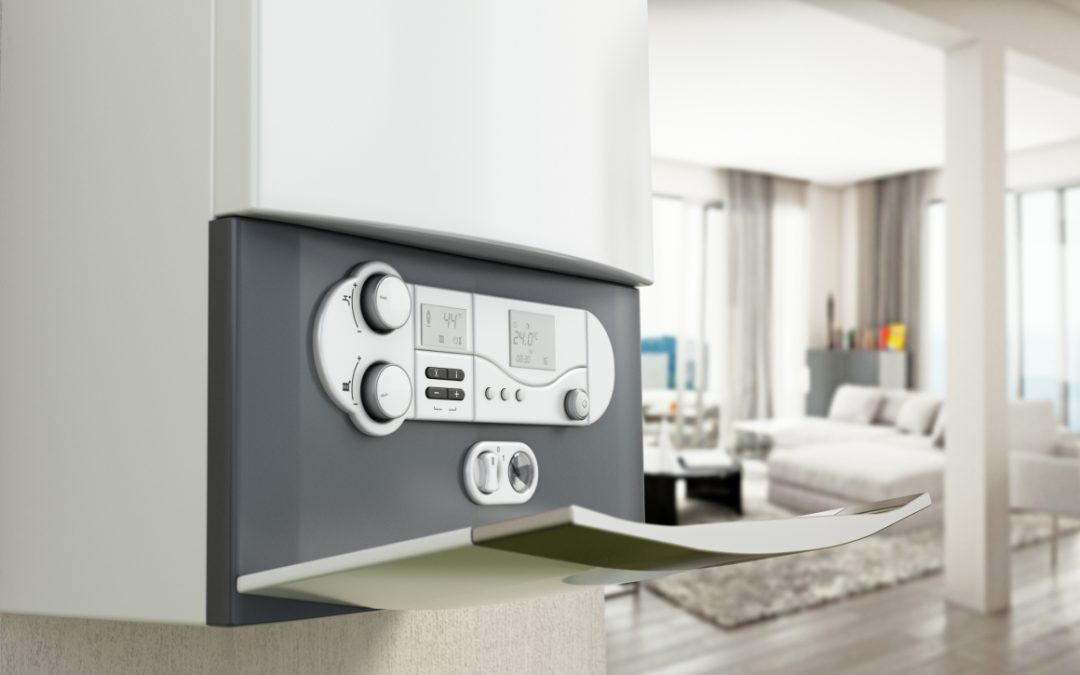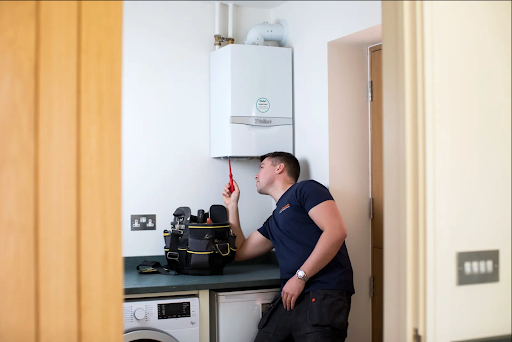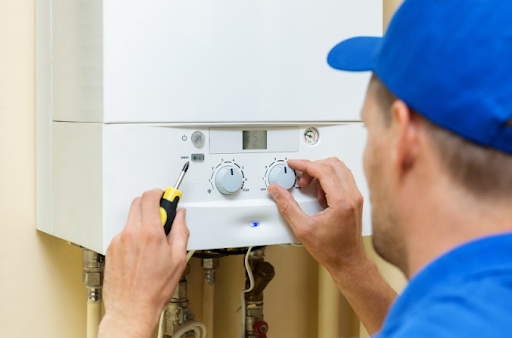If you’ve got hot water but no heating, your boiler may not be heating radiators as it should. This is a common issue in homes with combi boilers, often caused by a faulty diverter valve or low system pressure.
In this blog, we’ll explain issues that typically cause this problem, what you can check yourself and when to call a professional. You’ll also find advice on prevention and common faults to look out for.
Paine Manwaring provides expert boiler diagnostics and repairs across Sussex, Surrey and Hampshire. If your heating isn’t working, get in touch today to speak with a qualified engineer.
Why You’ve Got Hot Water But No Heating
If your boiler is not heating radiators but still provides hot water, the cause is usually mechanical or control-related.This is common in combi boilers, which heat water on demand for both taps and radiators. A diverter valve inside the boiler switches flow between hot water and heating. If it gets stuck in the hot water position, the radiators won’t heat.
Other causes include a pump that isn’t circulating water or a thermostat that isn’t sending the right signal to the boiler. These faults often don’t trigger an error code, so the boiler appears to be working, just not for heating.
These faults can be difficult to isolate without the right tools. In most cases, diagnosis and repair require inspection by a qualified heating engineer.
What to Check if You Don’t Have Heating
If your hot water is working but the radiators stay cold, there are a few checks you can make safely. These won’t resolve deeper faults, but they can help rule out common setup or circulation issues.
Check Heating Controls
A surprising number of heating faults come down to settings.
- Make sure the room thermostat is turned on, and it’s turned up high enough
- Check your heating schedule – power cuts can reset timers
- If you use a wireless thermostat, confirm it’s paired with the boiler and has a working battery
Even if your boiler is working for hot water, it won’t activate the heating unless these controls are calling for heat.
Inspect Radiator Heat Levels
Go room to room and feel each radiator.
- If none are warm, the issue likely involves the boiler or system as a whole
- If a few radiators are warm but others are cold, it may be a circulation issue like trapped air or internal build-up
You can try bleeding the radiators to remove air:
- Turn off your heating system
- Use a radiator key to open the bleed valve slightly (turn anti-clockwise)
- Allow air to escape, close the valve once water starts to come through
- Keep a cloth underneath to catch any drips
If some radiators stay cold at the bottom and warm at the top, this may point to sludge in the system. In that case, a system flush may be needed – this isn’t a DIY task.
Open Radiator Valves
Check valves at the base of each radiator:
- Turn manual valves fully anti-clockwise
- For thermostatic radiator valves (TRVs), make sure they aren’t stuck closed, as this can occur if they haven’t been used recently
Check the Boiler Pressure
Most systems need a minimum pressure level to circulate water properly.
- Look at the boiler’s pressure gauge (usually at the front)
- If it’s below 1.0 bar, the system may not function correctly
- Consult your boiler manual on how to safely increase pressure
Keep pressure between 1.0 and 1.5 bar, when the system is cold. Don’t open the boiler casing, only use the external controls.
Restart the Boiler
Sometimes a system reset will clear temporary faults.
- Use the reset button on your boiler’s front panel
- If there’s no dedicated reset button, turn the thermostat control to the reset position and hold it for 3 to 5 seconds until the boiler restarts.
Look for Warning Codes
Most modern boilers show error codes when something’s wrong.
- Refer to your boiler’s manual to check what the code means
- Don’t repeatedly reset the boiler to clear the fault. If the code returns, it needs professional attention
If these checks don’t restore heating, avoid further DIY. Do not open the boiler casing or attempt internal repairs. At this point, it’s best to contact a qualified engineer.
Common Causes of Hot Water But No Heating
If basic checks don’t resolve the issue, a fault in the boiler or heating system is likely. The causes below are the most common and usually require inspection by a qualified engineer:
- Diverter Valve Fault: If the valve is stuck in hot water mode, radiators won’t heat.
- Faulty Thermostat or Controls: If the thermostat or programmer isn’t sending the right signal, the boiler won’t start the heating cycle.
- Pump Problem: A jammed or worn circulation pump stops hot water reaching radiators.
- Low Boiler Pressure: Below 1.0 bar, the boiler may disable heating. This often follows bleeding or a system leak.
- Zone Valve Failure: In non-combi systems, a failed zone valve can block heating in specific areas.
- Airlocks or Sludge: Air or debris in pipes or radiators can restrict water flow.
When to Call a Heating Engineer
If you’ve checked the basics and your heating still isn’t working, the fault is likely inside the boiler or system, beyond what can be diagnosed safely without the right tools. The following signs mean it’s time to contact a qualified heating engineer:
- Heating still isn’t working after checks: If radiator valves are open, pressure is correct and the system has been bled, the issue is likely mechanical or electrical.
- Boiler is showing fault codes or warning lights: Error codes often point to component failures that require specialist tools to confirm and fix.
- You notice leaking, loud noises or unusual smells: These can indicate serious issues like internal damage or pump failure. Don’t ignore them.
- You suspect a diverter valve, pump or zone valve fault: These parts sit inside the boiler or system pipework and require professional inspection to diagnose or replace.
- Your boiler hasn’t been serviced in the past year: Lack of servicing increases the risk of faults and reduces efficiency. An annual check can often prevent breakdowns.
All work on gas appliances must be carried out by a Gas Safe registered engineer. Paine Manwaring is fully registered and qualified to inspect, repair and service domestic and commercial heating systems. View our full range of heating and plumbing services across Sussex, Surrey and Hampshire.
How to Prevent Heating Problems in the Future
Most cases of hot water with no heating are avoidable with regular maintenance. These simple steps reduce the risk of faults and help you avoid unexpected breakdowns, especially during colder months
- Book an annual boiler service: A yearly check keeps your boiler running safely and efficiently. It can catch early signs of wear, leaks or pressure issues before they lead to heating failure.
- Install a smart thermostat: Smart controls help you monitor heating use more accurately and detect faults early. Some models also send alerts when the system isn’t responding as expected.
- Consider a system flush: Over time, sludge builds up in radiators and pipework, reducing flow and causing uneven heat. A powerflush clears this debris and helps prevent circulation issues.
Preventative maintenance helps extend the life of your heating system and avoids the inconvenience of a boiler not heating radiators when you need it most.
What to Do If You Still Have Hot Water But No Heating
If you’ve gone through the checks in this blog and your boiler is still not heating radiators, the fault likely requires professional diagnosis. While some heating issues can be resolved with simple maintenance, others like a failed diverter valve, need inspection and repair by a qualified engineer.
Don’t ignore recurring problems or rely on temporary resets. Ongoing faults may affect boiler performance, efficiency and safety.
For expert help with hot water but no heating problems in Sussex, Surrey or Hampshire, speak with a Gas Safe registered engineer at Paine Manwaring. We provide prompt, professional support for diagnostics, repairs and ongoing boiler servicing.
FAQs About No Heating with Hot Water
Why are my radiators cold but hot water works?
This usually means the boiler is heating water correctly but isn’t sending it through the central heating circuit. Common causes include a stuck diverter valve (especially in combi boilers), incorrect thermostat settings or low boiler pressure. If all radiators are cold, it’s likely a system-wide issue. If only some are affected, it could be trapped air or sludge.
What does a diverter valve do?
A diverter valve controls whether your boiler sends hot water to the taps or the radiators. In a combi boiler, it switches automatically depending on demand. If the valve sticks in the hot water position, the boiler will prioritise taps and showers but won’t heat the radiators, even when the heating is on.
Can I fix my boiler pressure myself?
In most cases, yes. If the pressure gauge is below 1.0 bar, you can top it up using the instructions provided in the manual. The target range is usually 1.0 to 1.5 bar when cold. Only use the external controls and never remove the boiler casing.
Why does my boiler give hot water but no heating?
The boiler may have a mechanical fault such as a faulty diverter valve or pump, or a control issue like a thermostat not triggering the heating cycle. It’s a common fault in combi boilers, where a single unit handles both heating and hot water.
Can I fix my boiler if there’s no heating?
You can try a few safe checks: bleed the radiators, check pressure, reset the boiler and confirm the thermostat is working. If the heating still doesn’t come on, it’s likely a fault that needs professional attention.
Is it dangerous to have no heating but hot water?
It’s not usually dangerous, but it may signal a mechanical issue, like a failing pump or valve, that could lead to a full breakdown if left unresolved. Don’t ignore recurring faults or system warnings.
How do I know if my diverter valve is broken?
If your hot water works but the radiators remain cold, especially in a combi boiler, the diverter valve may be stuck in hot water mode. This is a common failure point and requires an engineer to confirm and replace.
Should I call a heating engineer?
Yes, if you’ve carried out basic checks and the heating still doesn’t work, or if you notice warning lights, leaks or unusual noises. Internal parts like the diverter valve, pump and zone controls require professional inspection and should not be handled without proper training.
Paine Manwaring is an established, professional and highly experienced supplier of plumbing, heating and electrical services to domestic and commercial customers throughout Sussex, Surrey and Hampshire.
For more information about our heating, plumbing and electrical services which we provide for both homes and businesses, get in touch with a member of our expert and friendly team today on 01903 237522 or enquiries@painemanwaring.co.uk (Worthing) or 01243 784711 or info@painemanwaring.co.uk (Chichester).




